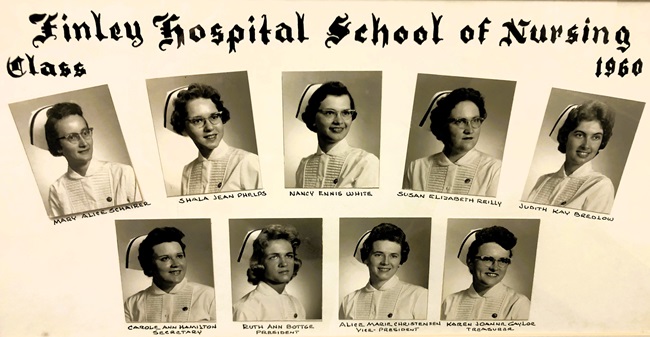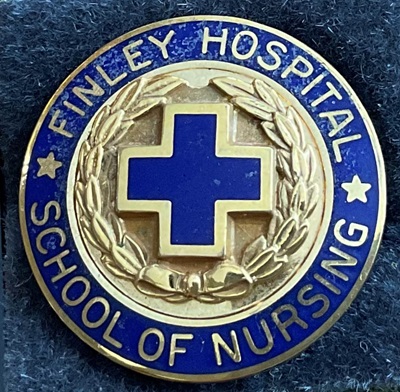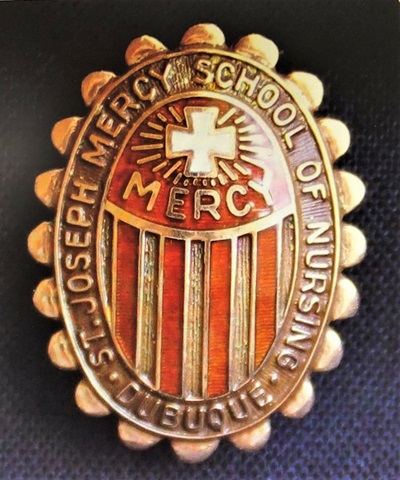The Finley Hospital School of Nursing was established in Dubuque in 1896. Just four years later in 1900, the Mercy School of Nursing was organized by Mother Mary Agnes, RSM. Both schools filled a need and provided the city with compassionate, well-trained nurses well into the late 1900s.

The Finley Hospital School of Nursing (FHSN)Click to subscribe for convenient delivery of Julien’s Journal by mail, or call (563) 557-7571. Single issues are available in print at area newsstands and digitally on JuliensJournal.com.
FHSN, one of the first six nursing schools in Iowa, offered a three-year course of study. The first class of four graduated on January 10, 1900, and each new nurse received a round gold pin bearing the inscription “Finley Hospital Training School” on an outer blue ring with an enamel cross in the center. On this date, there were two classes in the school with a total enrollment of fifteen.

In May 1924 the public was invited to an open house at the Lull-Burch Memorial Nurses’ Home located on Allison Street. The four-story building, located southeast of the hospital, was built in an L-shape. The building not only housed Finley nursing students but also included classrooms.
In 1938, FHSN closed due to a surplus of nurses and low student enrollment. The onset of World War II reversed the trend and in June 1942, the school reopened, enrollment got underway, and a new class of future nurses began in September.
FHSN operated under the regulations of the Iowa Board of Nursing Examiners. The school entered an affiliation with the University of Dubuque so nurses could attend classes in subjects required by the state board. The course load was rigorous and included physical education, dietetics, chemistry, and psychology. The course load was considered somewhat more than was required by student nurses enrolled at the University of Iowa. Admission to the FHSN required graduation from an accredited high school. Students in the lower third of their graduating class weren’t accepted without additional study and proof of ability.
Judy Bredlow Edmonds graduated from Dubuque Senior High School in 1957. She knew she wanted to become a nurse, so she enrolled at the FHSN immediately after graduation. “The first year, most of our classes were held in the Lull-Burch Memorial Home,” she recalled. “That’s also where we lived. We had to clean our own rooms. I still remember them telling us ‘If you clean the corners of a room, the center will always get done’ and ‘Nothing on the floor but your feet and the furniture.’ They were pretty strict.”
“The doctors taught most of those classes,” Judy said. “Then we walked over to the University of Dubuque for anatomy, physiology, chemistry, and courses like that. They put us on the hospital floor almost right away. We were on call too. They really worked us with going to school, working on the floor, and doing homework. But we had a lot of fun. Even when we were on call and got called in the middle of the night, it was exciting.”
Today’s nurses aren’t required to wear a uniform, but that’s not how it’s always been. “Our uniform was a blue and white striped dress and over that we wore a white, heavily starched apron with a top that hooked on,” said Judy. “It took some time to hook the apron together, so we did it the night before. Our white caps were also heavily starched.”
In September 1977, FHSN lost its accreditation from the National League of Nursing. After upgrading and increasing classrooms, formalizing staff development plans, and changing required courses, the school regained its status in June 1978. The accreditation was valid until 1986 and was extended until 1987 when the last class of seniors graduated in May of that year and the program came to an end.
The Finley Hospital School of Nursing Alumni Association was founded in 1913 to honor the traditions, history, accomplishments, and legacy of the FHSN. Although the Alumni Association folded earlier in 2024, the FHSN Alumni Association endowment continues to fund scholarships awarded to women and men in nursing.
St. Joseph Mercy Hospital School of Nursing
Mother Mary Agnes, RSM, established Dubuque’s St. Joseph’s School of Nursing, later known as Mercy Hospital School of Nursing, in 1900. In 1902, the first class of nurses graduated. The following year, the nursing education program was lengthened from two to three years.

On June 16, 1905, the Dubuque Enterprise offered a description of nursing duties, “Some of the special duties after acquiring the stripes are learning to serve meals, under supervision, and night work. The latter usually tests the nerve of the candidate and if she serves successfully through night work, she is apt to finish the course.”
In 1922, a two-story nurses’ home was dedicated on Langworthy St. The home filled quickly as three classes were admitted annually. Student nurses received board, laundry, lodging, and stipends of $5.00 per month. During the last two years, the stipend increased to $7.00. In 1935, a gymnasium and classrooms were added to the nurses’ home.
In 1938, the Mercy School of Nursing expanded with the addition of the Clinton School of Nursing. In 1943, the School of Nursing was established as the Division of Nursing of Loras College. Completion of three years led to a certificate in nursing education. Five years of study including two years at Loras and three years at Mercy resulted in the Bachelor of Science degree in nursing.
In the 1950s, the Mercy program disaffiliated with Loras, although courses were purchased from the college. In 1964, all arrangements with Loras ended, but in the fall of 1965, courses were first accepted from Clarke College and the nursing program was shortened to three years. In 1970, the program was again shortened to two years.
In 1973, the last class was admitted to the Mercy School of Nursing. The next year, Area One Vocational Technical School assumed all responsibility for that last class. In 1975, students received an Associate in Applied Science Degree with a Mercy Medical Center School of Nursing recognition diploma.
Finley and Mercy Schools of Nursing trained nurses in Dubuque for decades, educating and graduating hundreds of registered nurses who went out into communities to offer essential, professional, and compassionate nursing care.
The Shades of Dubuque is sponsored by Trappist Caskets, visit TrappistCaskets.com.
Click to subscribe for convenient delivery of Julien’s Journal by mail, or call (563) 557-7571. Single issues are available in print at area newsstands and digitally on JuliensJournal.com.


Comment here